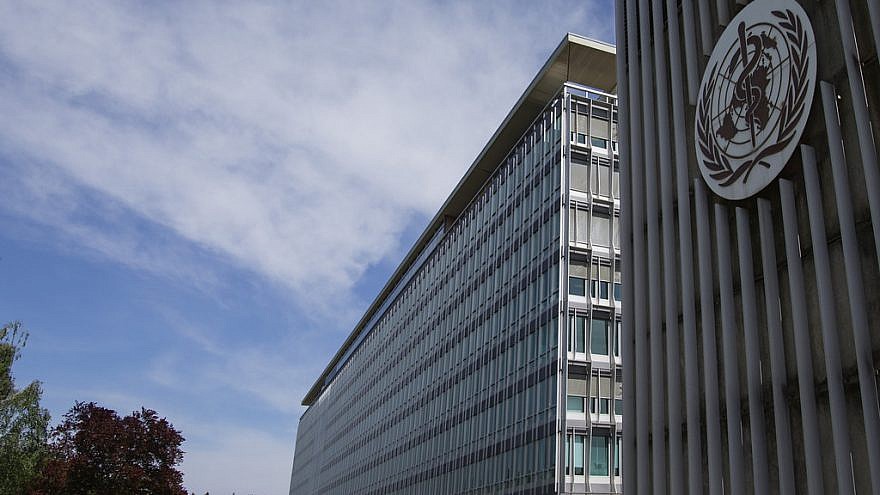The 72nd assembly of the U.N.’s World Health Organization (WHO) voted 96-11 this week for a resolution, co-sponsored by the Arab bloc and the Palestinian delegation, which singled out Israel over “health conditions in the occupied Palestinian territory, including east[ern] Jerusalem, and in the occupied Syrian Golan.”
The assembly in Geneva gathers annually to discuss internal and external questions facing the U.N. health body, with topics including market transparency for medicines; vaccines and other health technologies; the rise of Ebola in the Democratic Republic of the Congo; World Health Organization reforms; strategies for addressing snake bites; the shortfall of health workers; universal health coverage; and, finally, a condemnation of Israel for treatment of Palestinians in the West Bank and Syrians in the Golan Heights.
“This is the annual meeting of health delegations around the world, focusing on communicable diseases like tuberculosis to AIDS, and suddenly, out of nowhere, there is this peculiar politicization where suddenly one country is singled out and effectively portrayed as the only violator of health rights,” he commented, calling it a “thinly veiled attempt to scapegoat Israel.”
“Out of 21 items on the meeting’s Agenda, only one—Item No. 14 against Israel—focused on a specific country. There was no agenda item or resolution on any other country, including Syria, where hospitals and medical infrastructure have suffered devastating bombings by Syrian and Russian forces; Yemen, where 19.7 million people lack access to health-care service due to the current crisis; or Venezuela, where the health system has collapsed, causing millions to flee the country.”
Neuer called the resolution a “fantastic lie,” maintaining that the United Nations has “reached new heights of absurdity by enacting a resolution which accuses Israel of violating the health rights of Syrians in the Golan, even as in reality Israeli hospitals provide life-saving treatment to Syrians fleeing to the Golan from the [Bashar] Assad regime’s barbaric attacks.”
“In some places like Ramallah, Palestinians are doing better than most other countries in the region,” said Neuer, noting that while there are indeed health challenges in the Palestinian Territories that need to be addressed, and that while Israel is not above criticism, Palestinian health challenges are largely Hamas’s own doing.
“Gaza could be like Singapore, but Hamas has chosen to direct all their resources to building terror tunnels and rockets, instead of investing in hospitals and schools,” he said.
‘Others who push back can make a difference’
The report ignored the leading role of Hamas and other terrorist groups in orchestrating violent riots and deliberately encouraging demonstrators to approach the hostile area of the Gaza-Israel border.
Seeing through the absurdities and omissions, opposing the measure were the United States, United Kingdom, Australia, Canada, Brazil, Germany, Czech Republic, Guatemala, Honduras, Hungary, and, of course, Israel.
Those that voted “no,” like last year, were the United States, the United Kingdom, Australia, Canada, Guatemala and Israel, while those that changed their votes to “no” this year were Brazil, Czech Republic, Germany, Honduras and Hungary.
“It’s significant that these countries changed their vote,” said Neuer, who has been heavily involved in exposing U.N. bias against Israel in the German media, in particular. “It’s very encouraging and goes to show that groups like U.N. Watch and others who push back can make a difference, and we will keep doing it.”
Neuer will travel to Oslo next week for a public lecture following its “shameful” vote for the WHO’s resolution, which Neuer said “encouraged this hijacking of the annual world health assembly, and diverting precious time, money and resources from global health priorities, in order to wage a political prosecution of Israel, especially when, in reality, anyone who has ever walked into an Israeli hospital or clinic knows that they are providing world-class health care to thousands of Palestinian Arabs, including last week to Palestinian leader Jibril Rajoub, as well as to Syrians fleeing Assad.”
“Countries that care about international organizations should be the first to ensure that they do not become hijacked by a political agenda, which undermines the very purpose of the organization,” concluded Neuer.


























